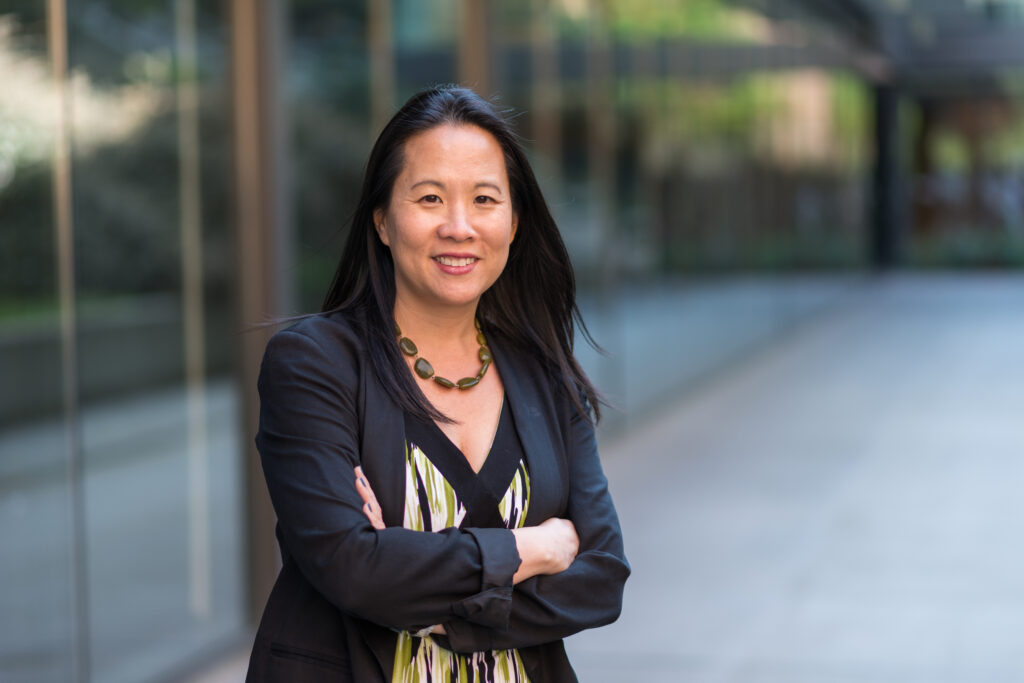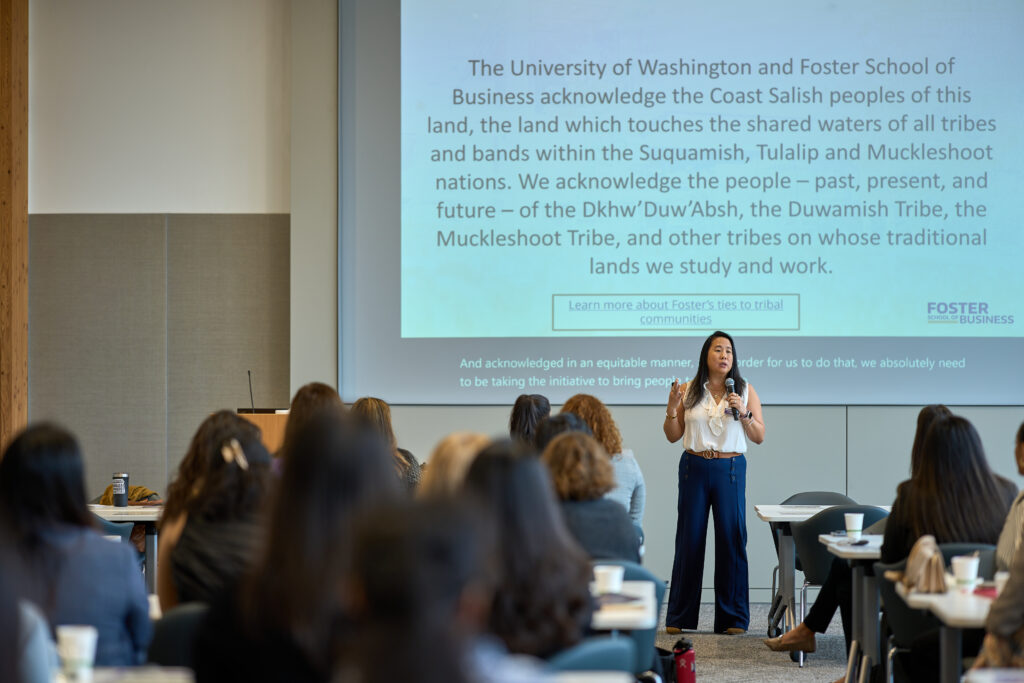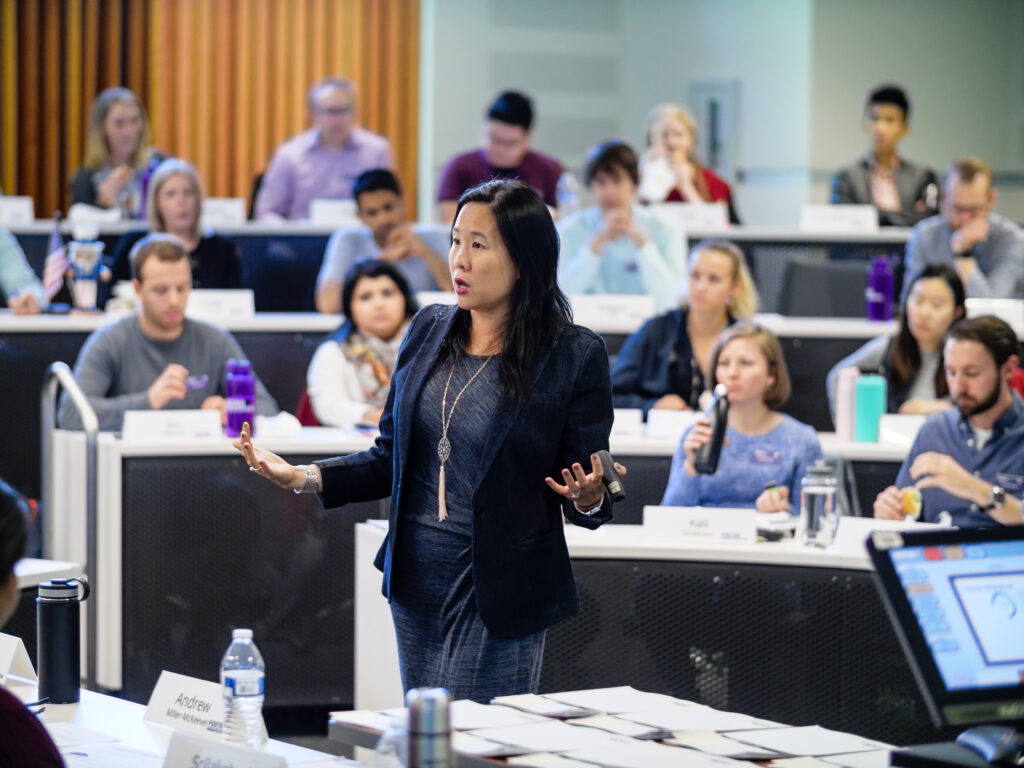Foster Management Faculty Spotlight – Christina Fong
Get to know Christina Ting Fong, Michael G. Foster Endowed Professor of Management who shares her experience teaching at Foster over two decades.
Please tell us a bit about yourself.
I have been a faculty member for 20 years at Foster. It’s absolutely a joy to be a part of this community and it’s something I really appreciate and love. In my life outside of work, I am a mom, a wife, and a dog owner. My older son is 16 and is a sophomore in high school. My younger son is 13 and a middle schooler. My two dogs – Ramona and Emerson – are Foster famous. They come to Paccar often and they know and love many students.

How would you describe your elective courses – Global Business Forum and Deal Making in High Velocity Ventures?
Global Business Forum (GBF) is a two-credit course that aims to extend students’ international perspective. Each quarter, there is a different theme and there are different speakers. One quarter is focused on a geographic region, one on an industry, one on a leadership skill. It’s exciting to learn alongside students. That’s why I love this course.
Deal Making in High Velocity Ventures is the second negotiations elective at Foster. It is a very practical course that focuses on skill building. Every time students come to class, they are doing at least one negotiation and providing real time feedback on peers.
What excites you about your subject area and what are some of your research interests?
I am an emotions researcher – I study feelings at work. I have also done research on the value of a business education. These topics are relevant to the electives I teach as well. I am lucky enough to be teaching the things people are naturally curious about, such as “why is it when that person talks no one listens, but when this person says the same thing everyone does?” or “why is it that a certain person seems to be running the show when they don’t seem to have the skills?” A lot of this has to do with understanding who we are as individuals, what identities we bring, and how these factors affect our influence in workplaces. We are teaching people the ability to articulate what they need and want in a situation. These skills are applicable in every domain of our lives – they make us better partners, friends, parents, better children to our parents. The most satisfying part of my work is when students tell me how the conversations and the discussions we’re having in the classroom have expanded beyond the classroom and into unexpected domains of their lives.

Which factors influenced your decision to join UW Foster?
Foster’s culture is very special. I always have the feeling that the students are working together with me to create a space that is full of learning, engagement and inclusion. I am well aware that many of my colleagues who teach at other business schools don’t feel that way. They feel like students are waiting to see if they make a mistake.
The other part I love is Seattle. When I moved here, Amazon was one building on a hill and South Lake Union was a sea of empty gas stations. It has been such a pleasure to see how the city has changed, to know that business has been a big part of that, and to see how our students have gone on to have a big impact in the city and the community.
What do you find meaningful about your time thus far at Foster?
The Foster school has moved to a place where the city and the community are really converging. The purpose statement – Together…We Foster Leaders, We Foster Insights, We Foster Progress…To Better Humanity – has a lot of meaning for me and drives so much of my commitment to the school. It is an authentic reflection of what everyone in our community wants. I remember having had to convince students why leadership matters. That seemed like an uphill battle because students would just want to learn skills that would make them more money. But students are increasingly interested in how they will shape the world along with issues such as race and equity.
How have you worked to make your classroom/course curriculum inclusive?
This is something I am very passionate about because of my former role as an Associate Dean of DEI. I was one of the co-developers of the Foster ID Framework for Inclusive Leadership, which helps students to think through how they are building their skills to leverage diversity and serve as informed allies and inclusive leaders.
In the classroom, GBF creates a space where we can explore equity issues and develop our intercultural competence. For MGMT 548, So much of being an effective negotiator is about being able to explore and leverage our differences.
From a pedagogical perspective, we know that students who speak up in class learn more and at a higher level. But if we only rely on volunteers, some people might never participate because of cultural differences. I use random call like many of my colleagues. I also spend time doing some community contracting to create a space that feels both safe and brave. Finally, talking about social issues can be difficult. I do a lot of normalizing people’s mistakes.

How have you supported students outside the classroom?
I helped students with salary negotiations. It helps me improve as a professor as well because it keeps me up to date on trends and evolving norms about what is appropriate and what isn’t in local company cultures.
Why should students take your course?
Learning happens when we are taking action and having fun. I am very passionate about wellbeing. I make sure the class is contributing to students’ wellbeing, so having some honest conversations about how much work is too much. My students love that I have a timer and we get up every 10 minutes.
What advice do you have for incoming students as they start the MBA?
Two pieces of advice: 1. This is an opportunity to set up very good habits for the rest of your lives such as exercising, sleeping well, and setting time up for self-reflection. 2. Push to make sure you are taking advantage of the diversity within this community. It is very important we are reaching out and building relationships with people who are different from us. The MBA community is a great playground to practice these skills. It is very tempting to stay within our comfort zones – people who would get our jokes. But the MBA is the time to step out of our comfort zones.
